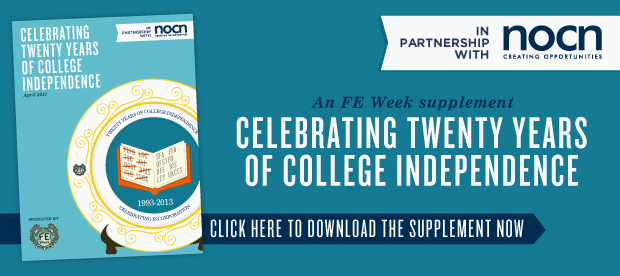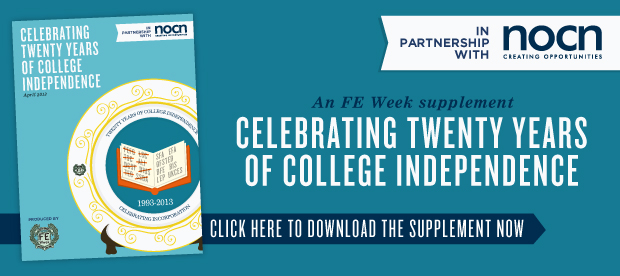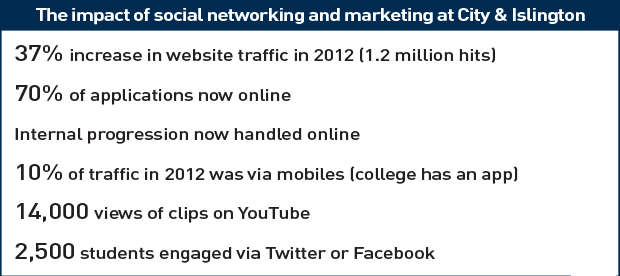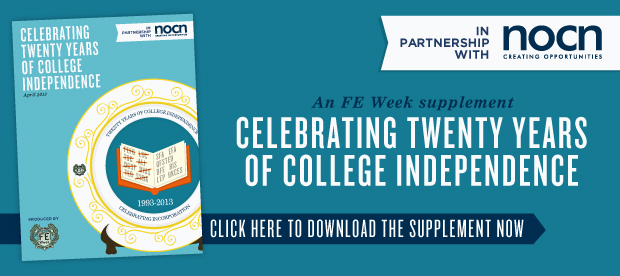[download#104]
Hear our voice, the NUS tells FE Guild
The National Union of Students will continue to push for a learner presence on the board of the FE Guild, describing the lack of representation as “wrong”.
President-elect Toni Pearce, who takes up the post in July, expressed anger after the revelation two weeks ago that the guild’s draft implementation plans did not include a student voice on the board. She is currently the union’s vice president for FE.
She said: “I don’t think it’s something that I’ll wait until July to say is wrong — students should absolutely be represented on board of the FE Guild.
“When students are represented in higher education bodies, why should FE students not have the same parity in terms of engagement? And frankly that’s what it comes down to, parity of esteem.”
The absence of student representation would be at odds with the direction of the rest of the tertiary education sector.”
The draft implementation plan compares the guild, which has yet to be officially named, to the HE Academy, which does have learner representation on its board.
Current NUS president Liam Burns said he would keep talking with the guild’s steering body in his last months in the role.
“The absence of student representation would be at odds with the direction of the rest of the tertiary education sector,” he said.
“An attempt to dilute the learner voice would also run counter to good practice in governing bodies in both higher education and further education, where two student governors are full members.
“In the coming weeks, we look forward to… making the case for national learner representation, and striving to ensure the student voice is at its heart.”
The draft plan allocates seats on the board to the Association of Colleges, the Association of Employment and Learning Providers, and the Association of Adult Education and Training Organisations.
It proposes “learners specifically be part of the wider sector engagement processes, rather than part of the governance arrangements”.
David Hughes, chief executive of the National Institute of Adult Continuing Education and independent chair of the steering group, said that how learner voices were heard would be part of the next phase of the guild’s development.
“The consensus in the steering group has always been that the guild must and will commit to engaging with and responding to the views of learners,” he said.
“I am looking forward to continuing to work with the NUS and others to agree how best we consult and engage with learners and discussing the priorities for the guild.”
The guild will be funded by a direct grant from the Department for Business, Innovation and Skills (BIS) for its first two years.
A BIS spokesperson said the establishment of a sector-led guild was central to placing learners at the heart of government reforms of the education and skills sector.
The spokesperson added: “Rightly, it is for the guild to decide how best to engage all stakeholders, including learners, in the ongoing development of its work.”
Christine Doubleday, deputy executive director of the 157 Group, said the group recognised the importance of the guild and welcomed the debate the implementation plan had stimulated.
She added: “The 157 Group is working within the steering group to ensure broad representation and responsiveness… and will seek to ensure that any views expressed in the consultation are taken on board by the steering group.”
Joe Vinson to become the NUS vice president for FE
Joe Vinson has been elected as vice president for Further Education of the National Union of Students at their annual conference today.
Mr Vinson has been president of Cornwall College student’s union since 2011, and a member of the NUS LGBT (Lesbian, Gay, Bisexual and Transgender) committee since 2013.
In his election speech at the NUS conference, he said: “For me college wasn’t just about qualifications, it was a place I finally felt I could be myself. I’m not a typical FE student; none of you are, because there is no such thing.”
Mr Vinson has been an active member of the Labour party for many years and at 18 was elected unopposed to St Agnes parish council, making him the youngest councillor in Cornwall and possibly the country.
It’s without any doubt that Joe has the skills and the determination to continue the fight for FE students.”
During his time at Cornwall College, Mr Vinson spearheaded a successful campaign to see all students who would have been eligible for the EMA awarded free transport to college.
He made reference to this in his election speech, saying: “Local action can be so effective and it’s a central part of winning for students, calling everyone to London once a year for a demo is not enough, we need grass roots campaigns with strong links to their communities if we are going to begin to meet the challenges we face.”
His election speech set out his stance on EMA, which he described as “a flawed system.”
But he added: “What we have now isn’t good enough. No student should have to beg their institution for help… I will fight for a support system that leave no-one behind.”
Mr Vinson had the support of his predecessor in the role, both as vice president for FE and as president of the Cornwall College SU, newly elected NUS president Toni Pearce.
She said: “It’s without any doubt that Joe has the skills and the determination to continue the fight for FE students. He’s a strong campaigner with a proven track record, and his work not just at Cornwall College but with students’ union across the country has been outstanding. I know that he will ensure FE students’ unions are well supported.”
The post-Incorporation college: a not-so-sleeping giant
Leeds City College is one of the single largest providers of apprenticeships in the UK following the launch of the Apprenticeship Training Agency — jointly owned with the local authority — and the creation of the Food Academy at city centre restaurant Flannels.
Now the third largest college in the UK with more than 40,000 students, 1,500 staff and an annual turnover of £90m, it is a far cry from 1993 and incorporation when the then small Kitson College was rebranded Leeds College of Technology.
Since then, one factor more than almost any other has contributed to the changing size and scope of FE — that’s merger.
While the Coalition government may be sceptical of the rush to merge, as have all previous administrations at times, the merger bandwagon has rolled on over 20 years with the creation of giants such as Newcastle College Group, Bedford and New College Nottingham. The litany of colleges absorbed into Leeds City includes Park Lane, Airedale, Wharfedale, Keighley, Thomas Danby, Joseph Priestley and Leeds College of Music (which retains its name as a wholly-owned subsidiary).
But what has changed beyond the size? On one level, less than you might think, according to Peter Roberts, (pictured) the principal since 2009 and chair of the 157 group.
“Skills I need for the job of chief executive have changed,” he says.
“Curriculum and quality used to be my strengths, but now I’m expected to be a politician, have networks, be around 24/7 and definitely not disappear for four or five weeks’ holiday.”
He still draws greatest strength from his curriculum roots.
“When I do my weekly blog and can write ‘I remember when I was a teacher…’ I know that adds to my credibility,” says Roberts.
And with ultimate responsibility for diverse operations from estates management and customer services to complex MIS and dealing with every level from pre-entry level students to HE for foundation degrees, now at record levels, “I need to be able to manage teams of people with skills I don’t have.”
What has not changed, Roberts insists, is the fundamental curriculum ideas and chances FE offers.
“At one time we were a tertiary college offering shipbuilding apprenticeships and flour milling. Now even the face of motor mechanics has changed and we offer advanced manufacturing and technology skills,” he says.
“But it’s still what it always was — a relevant curriculum.
“FE is, or should be, what it has always been at its best — bespoke tailoring of vocational education to suit individual needs.” But that tailoring — possible, he says, because of the economies of scale size brings — is bringing something new.
Work-based programmes, online learning and, recently, incubation start-up units helped create 300 new micro-businesses and 700 jobs in Leeds last year.
Work with business is a key area with Leeds City College having established links with more than 2,500 public, private and third sector companies from small and medium-sized enterprises to major household names including Arriva, First, Debenhams, IKEA, Lloyds TSB and BAe Systems.
Roberts warns, however, against FE losing sight of its other fundamental purposes.
With the disappearance of unskilled and semi-skilled work, “we are seeing more and more people with disadvantaged backgrounds, NEETs are rising and there’s more work to be done with Job centres,” he says.
“If colleges like us did not do the work, it’s difficult to know who would pick it up.”
So, despite the austerity we now face, he pleads with FE leaders not to lose sight of the basics, the LLDD learners, the mother returning to learn by doing flower arranging and finding a new career path and the young disaffected person in danger of becoming a NEET by being forced down an inappropriate route.
“For example, in Leeds, healthcare and digital technology are the big thing. But if I tell young people who want to be hairdressers this is what they must do, they will quit and become NEETs,” explains Roberts.
“We need to have time and patience to guide people appropriately. This is what FE at its best has always been good at.”
‘If that doesn’t work, we do it again.’ Really?
Next time you come across a member of your college marketing staff, treat him or her gently. They’re a much misunderstood lot, says Nick Warre
In 1990 I was one of the first people in FE to have the word marketing in my job title. There were very few of us, and we were not popular.
We were guilty of spin, sharp salesmanship (I wish) and the dark arts. We were the Mandelsons of our time. This wasn’t what education should be doing. It’s a noble pursuit and marketing had no place in it.
We all had trouble at home and we stuck together and formed something called the Marketing Network as a mutual support mechanism. It’s still going.
Come 1993 and it all changed. Competition, the DLE (demand led element) and the battle for bums on seats began and it was open warfare. Suddenly we weren’t doing enough of the dark arts. Heavens, jobs are at stake man!
Academic staff felt no shame about telling us how to do our jobs. Guerrilla marketing became common. There are some shocking stories from that period of people gate-crashing school careers’ fairs, bounty money (complicated), free gifts, theft, even the cunning use of projectors. It was exciting. But throughout this the marketing managers would still get together for a beer and to commiserate. Who else understood us?
Then the Further Education Funding Council noticed college marketing budgets were spiralling out of control and the National Audit Office showed up looking at value for money.
The college is seldom mentioned — FE is ubiquitous and strangely invisible”
They never did work it out, but we calmed down a bit and ground on with the job of being creative, poaching Year 11s and trawling the patch for punters. Budgets were trimmed and we got creative and dangerous again.
But marketing staff have a foot within the college and a foot outside. They have knowledge of both domains. The expectation was that they took messages out. The reality was that they also brought messages back. And some of these were unwelcome.
But there were always two critical problems. FE still has them.
The first is that marketing does not enjoy the same legislative hinterland as human resources, finance and health and safety. Marketing managers are still called on, or instructed, by college managers to do things that probably won’t work, but cost a small fortune. They can’t counter by calling on legislation. I recall one chap telling me: “At our college, if a course fails to recruit we put an advert in the paper. If that doesn’t work, we do it again.”
The second was, and is, that despite the fact that all of us are constantly surrounded by the products of FE (get your car fixed, go to a hotel, have a haircut, buy a sandwich, call a plumber, there they all are), but all that’s mentioned is who validated the qualification — “I’ve got my City and Guilds,” you’ll hear, or “My son’s doing his BTec,” and then there’s “I’ve got an RSA”.
The college is seldom mentioned — FE is ubiquitous and strangely invisible. Marketing managers, I salute you. It’s a hell of a job.
Nick Warren, freelance marketing specialist and consultant with the Policy Consortium
Forming an orderly queue to improve customer service
When the Association of Colleges helped give 31 enterprising colleges a permanent presence in India earlier this year, the initiative required a level of customer service to match that of the best export companies.
Education export services are already worth £14bn a year to the UK and are expected to rise to at least £22bn by 2020. So it was no surprise the trip to India involved Skills Minister Matthew Hancock helping, in his own words, “co-ordinate the government’s support for education as an export industry”..
And yet, 20 years ago, before Incorporation, colleges were largely characterised as public institutions focused on qualifications with little or no customer service, communication and marketing.
Jim Horrocks, former principal of Barnsfield College, recalls his first year in post when he observed growing queues waiting for a door to be opened at 2pm to process people for enrolment.
Something had to be done and the responsive college programme led by the FE Staff College, Blagdon, was designed to encourage colleges to prepare for market-led change that exploded during the 1990s.
In those early days, there was often something of a wish and a prayer in the operations”
Gazelle Group chief exective Fintan Donohue, (pictured) a member of that first team, says: “The responsive college programme promoted the idea of student as a customer and we spent much time with colleges, helping them recruit, train and support marketing managers for the very first time.”
The main legacy is seen in the Responsive College Unit (RCU), which continued as an independent agency after Incorporation, says Peter Davies, marketing consultant with the Policy Consortium.
He had helped create the College Marketing Network in 1987, which was crucial to supporting the RCU success and is still going, with around 180 members and an award scheme and annual conference in November.
But Incorporation brought a considerably more focused approach. “My impression of the marketing staff who attend is that their professionalism and competence has improved out of all recognition compared with the early days, and that the best practice in the sector now would be outstanding among any service organisations with comparable budgets,” says Davies.
Analysing customers and colleges in the 1999 publication Managing External Relations in Schools and Colleges, Davies points to the key change as that of a move from promotion to marketing. Far more precise market research was needed to inform decisions about curriculum development, stimulated in 1994 by the legal requirement on colleges to produce strategic plans.
“As a consequence, colleges adapted their management information systems (MIS) for the purposes of marketing intelligence, which had not been a primary consideration in their original design,” he says.
The workload on managers was incredible, says Carole Overton. “I was assistant principal at Deeside College. My responsibilities included marketing along with MIS, funding, planning, external work from companies, admissions, student services and multimedia learning and a few odd extras like nurseries. How I did all that I don’t know,”she says.
In those early days, there was often something of a wish and a prayer in the operations. Andrew Morris, formerly director of marketing and development at City and Islington College, recalls: “Bizarrely, I became director of marketing and development in my college with no background in the former. Someone had to do it.
“In fact I read about Ruth Silver’s approach at Lewisham College in a marketing magazine, took her advice and hired in a Blue Chip company. Certainly the quality and punch shot up; then it was taken back in-house and then the capacity and budget increased enormously with external recruitment — and the level of sophistication we see in FE today.”
Four into one equals success
City and Islington College, born in 1993, has faced challenges aplenty in its 20 years. Despite the blips, a birthday study shows how it has championed the community it serves, writes Andrew Morris
Take two FE colleges, one sixth-form centre and one adult education service, mix together slowly, simmer on a gentle heat and what do you get after 20 years? Something “outstanding in every single measure”, says Ofsted; “a model for others”, says a citation for one of the college’s Queen’s Anniversary prizes; “exemplars in the field”, say the words of the Learning Skills Improvement Service’s beacon award.
For most colleges in 1993, just taking over the multiplicity of corporate services from the local authority seemed challenge enough; the imposition of a new funding methodology at the same time looked decidedly risky. What crazy people would aggravate the situation by adding a cross-sector, four-way merger to the mix? Answer: Islington people.
To understand this paradox, City and Islington College decided last year to organise a study of its life. With the former principal, Tom Jupp, I interviewed staff of all types and vintages, pored over ancient statistics and spoke to students, past and present. The analysis, yet to be completed, throws light not only on the college’s path to 2013 but on many issues affecting the world of learning and skills. The story that emerges is one of immense change — no surprises there — but, unexpectedly, one that we found retold consistently by teachers, learning supporters, students, business support staff, premises personnel.
So what are the headlines?
“It’s more systematic, it’s tighter, we’re more accountable,” say the staff; “the quality of teaching and support is fantastic,” say the students; “they showed us how to grow up, love learning and move on to further things,” say the alumni — to paraphrase 48 interviews. Beneath the headlines lies a little more nuance. “There are also losses,” say the staff who mourn the freedoms they enjoyed before the age of indicators; “it gets harder and harder, competing for grades and jobs,” say the students.
One of the greatest changes is from paper-based to online systems (see table). Computerised management information has transformed the college’s knowledge of its strengths and weakness; online business processes have streamlined personnel, recruitment and financial control.
Then there are the changes that came with new business influences in governance. In came new expertise in real estate and finance; sites were consolidated and well equipped and attractive new buildings created, much better suited to modern learning in convenient locations.
An extremely positive image of what FE can do for a community emerges from this study”
Learning has been enriched by online access to materials and opportunities available in every classroom, library and learning support areas. The curriculum has grown — forensic sciences, veterinary nursing, media technology — and with it have come opportunities for new kinds of enterprise and partnership, providing students with real work experience.
But the path of growth and development has not been quite as smooth as these changes might suggest. Political swings and economic turbulence leave their trace over 20 years. Enrichment activity, once the preserve of more privileged schools and universities, stimulated aspirations for higher education and supported vulnerable people at critical moments. It opened up a world of possibilities — intellectual, enterprising, cultural and social — but as resources have reduced, the college has struggled to maintain what it can.
Even more severe have been the changes in funding for adult learners, with rising fee levels and diminished Esol funding systematically reducing their number. Swings in government attitudes to school sixth forms have also proved a challenge.
The 11 to 16 partner schools of the Sixth Form Centre (now College) long ago pooled their small sixth forms and paved the way for the enormous success of this part of the college, but today separate small sixth forms are back in vogue.
By contrast, some aspects of college life have developed. Careers guidance, counselling and supported learning services have improved, as have procedures for safeguarding vulnerable young people and adults, support for learning, and attention to pedagogy.
New vocational curriculum areas have been introduced to meet new demand in areas such as counselling, beauty therapy and sports science. Others, such as electrical engineering, have closed. Higher education provision and courses providing access to higher education have increased, particularly on the vocational side. ‘Social mobility’ has been supported for thousands of people going on to higher education: 1,315 in 2012, including 98 to Russell group universities.
City and Islington College’s new sixth form campus, in Goswell Road, London, and inset- the old campus in Benwell Road, London
So what of the overall picture?
The first 20 years at City and Islington have certainly seen challenges aplenty, as they have for colleges everywhere. Contract negotiations in the early 1990s, vacillating national policy on qualifications and funding, increasing group sizes, greater workloads, repeated restructuring and redundancies — all have left their mark.
Yet whatever the external stresses over the years, an extremely positive image of what FE can do for a community emerges from this study of a single college over two decades.
It shows students and staff united in valuing the quality of their relationship, and their respect for one another as the key to successful learning. The college’s unremitting emphasis on its students, their learning and support, is backed by all in the college community – from security guard to director of finance.
Perhaps the last word should go to a former student interviewed for the study. In describing the experience from a student’s point of view, Huseyin Acar told us: “Without the college, I would just have worked in a small shop as lots of people in my position do. This college gives a chance to people. It opened my way, so I could see the opportunities. The college allowed me to choose and gave me the tools to achieve my objectives. It gave me advice, guidance and personal support. It’s a long term relationship. We’ve run this journey together.”
Huseyin began as an Esol student at 16, progressed through A-levels to university and in two years expects to be an architect. His long-term ambition is to become a governor of the college.
Andrew Morris, a former director at the City & Islington College
How do you solve a problem like ‘college’?
Public confusion about the identity of a “college”, poor media perception of FE and a lack of skills among college press officers combine to prevent the sector getting better media coverage, it is argued.
A brief study of journalists’ perceptions of the sector for FE Week points to a continued poor understanding among news editors — the “gatekeepers” of the national media.
But it also reveals a failure among college press officers to spot and promote good stories, suggesting a lack of practical journalistic skills and experience.
Education correspondents interviewed for the study said it was rare for a college press officer to really show a clear understanding of what makes a story.
One said: “Despite having media studies degrees, they don’t seem to understand the difference between marketing and communications.”
Janet Murray, (pictured) a regular writer for FE Week and the Guardian and founder of the Last Word media consultancy, said: “People constantly come to me with stories about buildings and not policy or people. There is a clear lack of training and expertise.
“There is a lack of space in the media and editors want the nitty-gritty about education maintenance allowances and apprenticeships.”
Liz Lightfoot, former Daily Telegraph education correspondent, said there was a perennial problem of attitude among news editors — “One comment from a news editor was that everyone has been to school and knows about university, but not everyone knows about further education.”
But she echoes Murray’s concern, saying “press officers need to rise to the challenge”.
There is no doubt that media coverage has improved since incorporation, with the rise of national online services and high-profile trade media.
TES FE Focus was launched in 1995 and quickly followed by Guardian Further. While the latter closed and FE Focus has moved to become online only, the not-even-two years old FE Week is now the only newspaper dedicated to the sector.
Problems of a poor public understanding of FE have been revealed in work by the Association of Colleges (AoC).
A survey for the AoC by ICM Research in 2011 showed the confusion in the public mind about the identity of a college.
Two thirds (72 per cent) of the public thought Trinity College Cambridge was an FE college and over half thought the same of Eton.
Just over half believed they were still run by local authorities and one-in-five said they weren’t inspected by Ofsted. Nearly a quarter assumed they took less pastoral care of students than schools.
But once it was explained what colleges did, their impression was very favourable and more than 80 per cent said they would be happy for their children to go to one and thought they made an important contribution to the local economy.
Around 90 per cent concluded they gave people a second chance at education.
One answer may be to make colleges “a recognisable ‘brand’.” Work for the AoC by the consultancy Branded concluded, however, that this would be highly problematic.
First, unlike the word ‘university’ which has a legal definition, the word ‘college’ has an established usage elsewhere in schools.
Second, FE colleges cover a diverse range of activities targeted at different audiences, making an all-encompassing brand potentially so broad as to be meaningless or even self-defeating.
One possibility suggested by Branded is for the sector to agree on a common set of values over and above individual products and services.
They could then adopt a kitemark or Charter mark, indicating membership of the AoC for example, in the way that travel agents might belong to ABTA.
It is the sort of proposal that makes the government’s proposed Chartered status for the further education sector, currently out for consultation, possibly even more attractive.
The rise of the entrepreneurial college
Former hairdressing apprentice Jodie Whitemore (pictured right) is running her own salon at the age of 20 while completing a foundation degree at West Nottinghamshire College.
Just four years ago, she started her NVQ with no school-leaver qualifications and looked destined to add to the growing bank of NEET statistics. But Asha Khemka, her college principal, had other ideas with the creation of the Ashfield Centre aimed at capturing the likes of Jodie.
Nineteen-year-old Joseph Johnson (also pictured) is a similar entrepreneurial success story. While studying professional cookery at the college, he helped create the Forest Ferret company, producing and selling jams and preserves.
When Khemka launched the Ashfield Centre, she discovered that public funding would never meet the centre’s needs and so founded the Inspire and Achieve Foundation — a charity separate from the college — to fund it.
Based in former South Yorkshire coal-mining communities with severe cycles of inter-generational deprivation, the college had to act, she says.
In September, Khemka launches Vision Entrepreneur — a programme designed to support the job-creators of tomorrow — where enterprising students from the college and local sixth-forms will learn what it takes to succeed in business while hearing from inspirational guest speakers.
Similar initiatives can be seen springing up elsewhere, and not just for NEETs.
Among them is the Gazelle Group of 20 colleges, launched in April 2011, which its chief executive, Fintan Donohue, describes as “subversive” in intent.
“The group promotes the idea of entrepreneurial colleges as a disruptive influence for positive change in the purpose of colleges and the nature of their offer,” he says.
Technological change is rapidly replacing colleges and classrooms as the route to knowledge and skill”
Colleges have been striving for a more enterprising approach ever since incorporation — reaching out to the community, creating arms-length college companies which reinvest profits in learning, and franchising courses to reach people in the workplace, but they too often came to grief for overstepping the mark or being accused of using public funds for private training. But, more recently, it has been seen as quite respectable for colleges have come to the rescue of collapsed or failed enterprises, such as the Newcastle College Group takeover of Carter & Carter and Khemka’s own college appropriation of training company Pearson in Practice.
Several factors are forcing a change of attitude and approach, says Donohue.
“Traditional colleges and qualifications no longer provide the career opportunities they once did,” he explains.
“Young people are more open to the sort of entrepreneurship already established in countries like India and Africa. Technological change is rapidly replacing colleges and classrooms as the route to knowledge and skill. And the recent European Commission report makes entrepreneurial education its number one priority.”
This constitutes a far more generalised rather than utilitarian view of students being enterprising and entrepreneurial, he says.
“We need people who are ‘enterprising’ in all the dimensions of their life, not just about their career paths and financial investments,” explains Donohue.
For Sally Dicketts, principal of Oxford & Cherwell Valley College (a Gazelle member) the way to bring the best of the past and present together is through the creation of a learning company, where students are employed in real commercial operations as a significant part of their college experience. From September, business students will work in administration and marketing, media students will make films for local businesses, motor vehicle students will provide MOTs to paying customers and art students will develop community art projects.
A tutor-led and assessed programme taking 30 hours a week will combining work experience and individual study.
“At the end of their programme they can choose to work permanently in the learning company or with our own employment agency to gain employment or progress into higher education,” she says.








